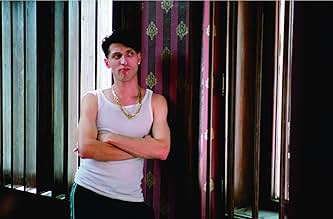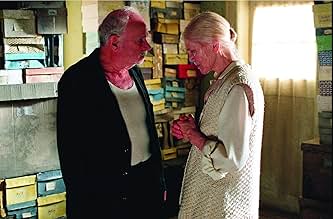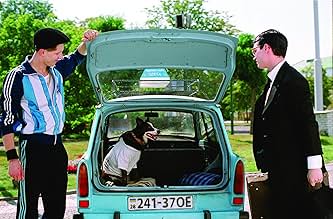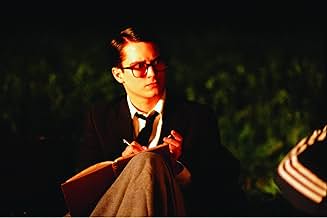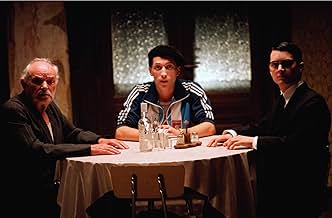Un joven judío americano intenta encontrar a la mujer que salvó a su abuelo durante la segunda guerra mundial en un pueblo ucraniano que finalmente sería destruido por los Nazis.Un joven judío americano intenta encontrar a la mujer que salvó a su abuelo durante la segunda guerra mundial en un pueblo ucraniano que finalmente sería destruido por los Nazis.Un joven judío americano intenta encontrar a la mujer que salvó a su abuelo durante la segunda guerra mundial en un pueblo ucraniano que finalmente sería destruido por los Nazis.
- Dirección
- Guionistas
- Elenco
- Premios
- 7 premios ganados y 6 nominaciones en total
- Grandfather
- (as Boris Leskin)
- Ukrainian Band Member
- (as Sergej Rjabcev)
- Ukrainian Band Member
- (as Jurij Lemeshev)
- Dirección
- Guionistas
- Todo el elenco y el equipo
- Producción, taquilla y más en IMDbPro
Opiniones destacadas
There is indeed plenty of humor: eccentric, un-subtle, sometimes somewhat twisted humor: the kind of humor I generally find very appealing indeed. But most of the humor is the kind that appears conscious at all times of things deeply serious, deeply sensitive, even deeply painful. The movie weaves together themes of Past and Present, Perception and Truth, Memory and Activity, Life and Death. The entire movie is suffused by the history of European anti-Semiticism in general, and of the Holocaust in particular.
How can Humor and Horror be combined in the same movie? The review I saw suggested that the humor is Absurdist. I don't think this is the case at all; at least not in the common sense. Instead, I think this movie stands in the tradition of much Jewish / Yiddish literature and theatre. I don't claim to be any kind of expert in this area; but from what I've seen, Humor is used, in this cultural context, both as a coping tool for the horribly tragic experiences of this people; and also Humor is used as a means of "recovering the Divine" for men and women who choose a path of Faith rather than a path of either Despair or Absurdism. See "Fiddler on the Roof" for Humor used in both ways in this rich tradition.
Elijah Wood (Jonathon) Wood wears horn rimmed glasses that really make him look, well, strange: compare Sin City when he wore the same kinds of glasses with chilling effect. In this movie, it's easy to see how the glasses become a metaphor for both his Search and for his Struggle between Perception and Truth. Eugene Hutz (Young Alex) and Boris Lesking (Old Alex) are both really just wonderful. Jonathon and Young Alex are from the same generation, yet seem so very, very different; and then find that they are not so different after all. And the way in which the Apparent Narrative Voice changes gradually from that of Jonathon to that of Young Alex .. as a journey of intended discovery for Jonathon becomes one of discovery for both Young Alex and Old Alex ... is to me so very moving.
There are some wonderful scenes and panoramas from (I'm told) Prague and environs, standing in for the Ukraine of the story line. All feels very authentic and seems to give a wonderful sense of place; although I've never been myself to the Ukraine and can hardly testify to this from first hand experience.
All in all, if you're looking for light comedy, I would not recommend this movie at all. On the other hand, if you are interested in a wonderful, delightful, and deeply moving film, please, check out this wonderful movie.
Liev Schreiber makes his directorial debut with a playful angst usually associated with his acting ethos. When successful actors decide to sit in the director's chair, we usually get a biographical glimpse at the souls beneath the acting mask- Check. We usually get a mishmash of genres- Check. But what we normally do not get is an insightful original film which is credible, intelligent and moving.
Elijah Wood plays Jonathan, an inquisitive young boy who collects pieces of life as he goes. He is on a mission to find a woman in a photograph. The sepia picture bears his grandfather (an uncanny resemblance to him) and the woman. To aid his journey he enlists the help of travel guides that comprise of a Hip-Hop loving break-dancer, Alex (Eugene Hutz), his apathetic and perma-vexed grandfather (Boris Leskin) and his dog- Sammy Davis Junior Jr! What ensues is essentially a comedy. There is an un-patronisingly simple introduction with voice-overs. Alex's is especially funny as he educates his younger brother on the year 1969, proving how popular he is with the chicks and break-dancing thus setting him up as Jonathan's antithesis.
Schreiber begins to break down the characters as they progress and the comedy acts as an intentional veil to what is a story about three people linked to the holocaust who do not really know themselves. All three hold the film with tenderness and authenticity something Schreiber was unlikely to get wrong and as enchanting and fantastical as the film is, the horrors that are allowed to crack through, i.e. the past are presented in an almost palatable tone (incidental music, cinematography) which make them all the more unsettling.
As the unlikely group finally find the town they seek they learn of the true atrocities that occurred and find out a lot about who they really are.
Elijah wood is as authentic as usual, bringing his usual innocence and strength to the screen. Formally a resident good in Lord of the Rings and a resident evil in Sin City he plays Jonathan with aplomb as he is bombarded with culture shocks and a quest for truth. Boris Leskin as the grandfather also delivers his angst and frustration at the youths with great humour and conviction as his own past is unravelled. However, it is Eugene Hutz as Alex that makes the show. The director using that old trade of translation misunderstandings to create and maintain a humour that is actually funny and not gimmicky.
Schreiber has delivered an enchanting debut that has both heart and soul. The continuous score and beautiful photography creates a fairy tale haze around a story about identity, truth and family. If there was a complaint, it would be the speed at which the film changes direction; though this could have been intentional it may not sit well with all. Nevertheless this is a sterling effort that delivers great comedy and bonding between an unlikely group while dissecting another aspect of the horrors of World War 2 in a completely fresh fashion.
-Chi&Ojo
Based on the novel by Jonathan Safran Foer, Everything Is Illuminated is the directorial debut of actor Liev Schreiber. Schreiber also wrote the screenplay. In the movie, Jonathan (Elijah Wood) obsessively collects items from his family, from toothbrushes to retainers to scraps of paper which he then seals in ziploc bags and pins to a wall in his house to record his family history. But the space for his grandfather is conspicuously bare. All Jonathan really has of him is a piece of jewelry and an old photo of him with a woman who hid him from the Nazis during the Second World War. Jonathan decides to undertake a quest to Ukraine to find the woman, thank her, and learn more about his grandfather.
His quest is aided there by a couple of characters who run a tourist company for Jewish people, including a young man obsessed with western culture (Eugene Hutz), his grandfather (Boris Leskin), who thinks he is blind and who may have memories and demons of his own from the war, and his grandfather's temperamental seeing eye dog.
The screenplay effectively combines both humour and drama as the three characters travel through the countryside looking for Jonathan's grandfather's town, driving deeper and deeper into the memories of the past. The best performance probably comes from Eugene Hutz, playing Alex Jr., who starts the movie as a tracksuit-wearing, break dancing slacker just out to have fun but evolves into something more as not only Jonathan, but all the characters gain their own illumination.
Liev Schreiber, Elijah Wood, and Eugene Hutz attended the screening and did a very humorous Q&A after the film:
- Schreiber was very close to his grandfather, who was a Ukranian immigrant, and who died in 1993. This caused him to start to write to get his memories down on paper. Meanwhile, he was asked to do a reading of Foer's short story, The Very Rigid Search, which was an excerpt from the still unpublished novel. Schreiber was blown away by the quality of the writing, saying that Foer had done in 15 pages what Schreiber tried to do in 107. Schreiber approached Foer and they talked about their grandfathers, culture, movies, and the nature of short-term memory in America; in the end, Foer agreed to let Schreiber adapt the book.
- Schreiber's own project was intended to be a road movie, but the book has parallel narrative that is an imagined chronological history of the town of Trochenbrod that spans 500 years; given his budget and limitations as a filmmaker, he said he'd leave that to Milos Forman and take the road trip instead. This imagined chronology was what moved him to make the movie in the first place, the idea that "a past lovingly imagined was as valuable as a past accurately recalled".
- Schreiber said the movie was a series of happy accidents. After searching unsuccessfully in Ukraine for an actor, he was walking through the Lower East Side in New York, when he saw a poster of a woman centaur, topless from the waist up, with an insane cossack sitting astride her. Under the poster said the name Gogol Bordello Ukranian Punk Gypsy Band.
Eugene Hutz then took over the story. He had never pursued acting as music was his first passion. One day, a friend gave him the book, and he thought it was written in a manner similar to how he writes music; screw sentences/syntax, language is my own.
Later, they got a call from a production company, looking for eastern European music that was medieval but modern. Hutz met with Schreiber, and he soon found the movie was based on the book he just happened to be reading. Not long after that came up, Schreiber asked Hutz what he thought about Alex and whether he could do the character by any chance.
- Foer and Schreiber talked about the film in the fall of 2001, shortly after the events of September 11. Both were in Europe at the time and they talked about the derogatory comments they were hearing about Americans, which led Schreiber to want to try to find an articulate American who would defy the stereotype that Europeans have of Americans. Someone who was awkward, vulnerable, flawed, innocent, and looking for history beyond the borders of his own country. Schreiber started thinking about who that was, and Elijah came up.
One of Schreiber's inspirations as a filmmaker is Emir Kusturica (I think that's who he said, who also directed a segment in another festival movie, All the Invisible Children) who said "you don't look for the actors, you look for the people." Schreiber said there is something about who Elijah is that he has a generosity of spirit and a sincere goodness as a human being, that came across on film. Schreiber said that the eyes are important when trying to articulate a character who is an observer, and that if "eyes are the doors to the soul, Elijah's are garage doors."
- Elijah Wood had fun with a question about the similarities between his character Kevin in Sin City and Jonathan in this movie as both are sort of a blank slate on which emotions are projected. Wood replied that Jonathan may seem still and seemingly emotionless, but it is all about his observations, about his experiences with other characters and the environment he was in.
- On the differences between directing and writing: Schreiber said he likes writing a lot more and jokingly described directing as "hell". After his grandfather died, Schreiber started to think about how to preserve some sense of history and himself; is he content driven or not, or just good at interpreting other people's work? He said he loved the exercise of figuring out what is emotional to you, important to you.
"Everything Is Illuminated" is a strange movie about a weird young man with the compulsive behavior of collecting souvenirs from his family to not forget them that seeks the past of his grandfather to understand how could be his life if his grandfather had not moved to USA. This bizarre vegetarian character meets a dysfunctional Ukrainian family that owns an amateurish travel agency specialized in helping Jews to find missing relatives, and together they have an almost surrealistic road-trip through the country of Ukraine. The movie begins like a comedy, with a sarcastic black humor, and ends in a touching and tragic drama recommended for specific audiences. My vote is seven.
Title (Brazil): "Uma Vida Iluminada" ("An Illuminated Life")
¿Sabías que…?
- TriviaEugene Hutz's band Gogol Bordello appears as the polka band that greets Elijah Wood at the train station.
- ErroresWhen the Grandfather repeatedly sounds the horn of the car, he presses the middle of the steering wheel to do so. In the Trabant, the horn is activated by pushing the signal light lever forward.
- Citas
Alex: I have reflected many times upon our rigid search. It has shown me that everything is illuminated in the light of the past. It is always along the side of us, on the inside, looking out. Like you say, inside out. Jonathan, in this way, I will always be along the side of your life. And you will always be along the side of mine.
- Créditos curiososSeveral songs are credited to the New York punk/Gypsy/Jewish klezmer band, Gogol Bordello, which is led by Eugene Hutz, who plays Alex in the film (the same band greets Jonathan when he arrives on the train). The last of these songs, "Start Wearing Purple (For Me Now)," which plays over the end credits, is credited to both a correct spelling (Gogol Bordello), dg and Gogol Bodello, an incorrect spelling.
- ConexionesFeatured in Today: Episode dated 24 November 2005 (2005)
Selecciones populares
Detalles
- Fecha de lanzamiento
- País de origen
- Sitio oficial
- Idiomas
- También se conoce como
- Everything Is Illuminated
- Locaciones de filmación
- Productoras
- Ver más créditos de la compañía en IMDbPro
Taquilla
- Presupuesto
- USD 7,000,000 (estimado)
- Total en EE. UU. y Canadá
- USD 1,712,337
- Fin de semana de estreno en EE. UU. y Canadá
- USD 66,806
- 18 sep 2005
- Total a nivel mundial
- USD 3,601,974
- Tiempo de ejecución1 hora 46 minutos
- Color
- Mezcla de sonido
- Relación de aspecto
- 1.85 : 1
Contribuir a esta página



